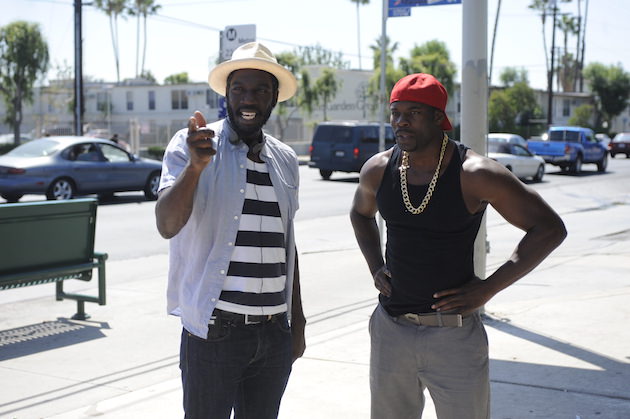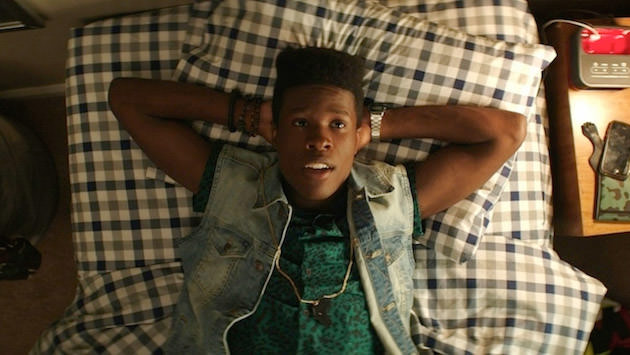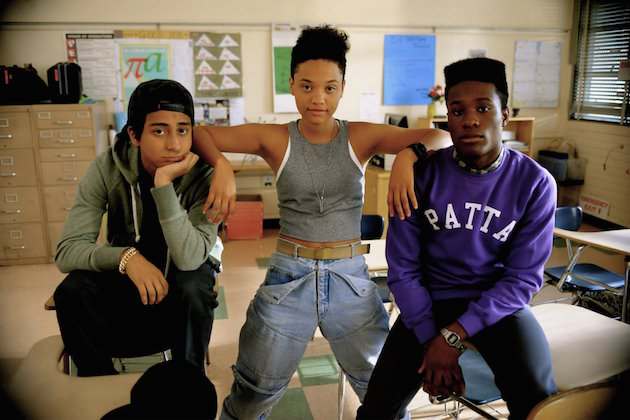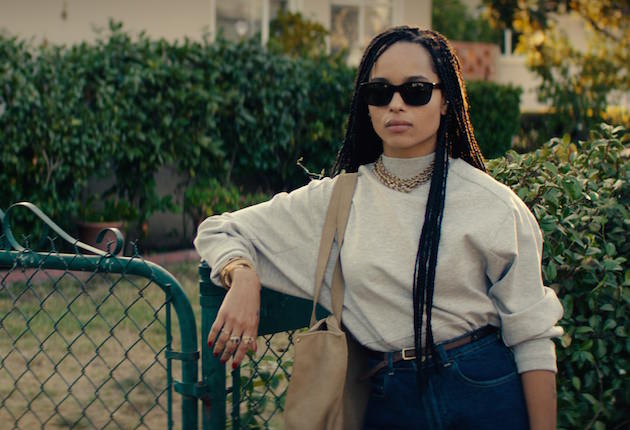Dope Debuts in Theaters After Smashing Sundance Premiere
One of the buzziest crowd-pleasers to come out of Sundance, Dope tells the story of Malcolm, a 90s hip-hop obsessed geek from Inglewood with dreams of studying at Harvard. After a wild night there’s suddenly a backpack of drugs standing in his way and only his two nerdy friends to help him offload them. (Hint: their plan involves bitcoin).
We talk to writer-director Rick Famuyiwa, who grew up in Inglewood, about making his fourth feature film and how he recruited Pharrell Williams for the soundtrack.

It’s such a fun, uplifting and funny film- how did you decide to tell that kind of a story?
It was sort of something I’d been thinking about for a while. Telling this story about these kids that don’t quite fit into their environment and they’re labeled nerd or geek because they just don’t quite conform. But, I wanted their non-conformity to be very specific to their environment. So, in their environment, they’re seen as geeks but in another culture or environment they might be the cool kids. And how that shifts depending on who you are, where you are, and where you’re from.

You’ve said that the main character Malcolm is modeled on you in some ways? In what ways? Do you have a thing for ‘90s hip-hop too?
Yeah, I mean that was my generation. That was when I came up, so I have a connection to that music but also just in terms of the way he sees the world. I think a lot of the way I see the world, or some of the things I wanted to say through him, and I think the way I looked at things when I was Malcolm’s age, is similar to the character. So I was drawing from my own ideas and, in some cases, experiences when I was thinking about that role.
One of the interesting things about the film – as you were saying they’re geeks in the environment that they’re in- and by focusing on the geeks it subverts the usual clichés of African Americans that we see in film, and it also feels very honest and real. How did you achieve that? And was that something that you were consciously trying to achieve?
On some level I’m very conscious of it because I know the sort of tropes of people’s experience with these characters that look like Malcolm and his friends on screen. So, often we think we know these kids and often they’re defined by those films that we see, and TV shows that we see, that depict these worlds. In some ways it was taking that and trying to subvert it, and taking that and putting a mirror to it, or taking that and using it so I can tell a story and let it go into places that were completely fantastic and almost unbelievable but knowing that people would believe it because there’s been a history of storytelling that allows them to believe it.
So, you sort of used that history against itself in a way?
Yeah, in some ways. I was sort of building towards the end of the film when Malcolm and his personal statement address that journey and those perceptions.

It’s a low-budget, indie film but it’s also very accessible. Did you set out to make something with wide appeal?
Yes. I felt like this is a story that connects in a big way and a broad way and so I don’t think that their experiences were niche in any way. It always felt mainstream to me, but I always wanted to redefine what we consider mainstream. The only thing besides budget that wouldn’t naturally make people think this is commercially viable is just the fact that it’s about three kids of color that grow up in Inglewood. But we wouldn’t have those same ideas and perceptions if they were three kids that grew up in the suburbs [laughs], you know? I felt like if we could get this story out there it could connect in a commercial way and that was the goal.
It received a great reception and Sundance- winning awards and inciting a bidding war. Did you expect it to be such a hit?
You never expect that but I was confident that it would do well. I felt, especially juxtaposed with a lot of films that end up at Sundance, this would feel like kind of a breath of fresh air. I felt like if we could get it in front of an audience, not knowing exactly how the Park City audience would react to it, but feeling like we had something special that people would connect to. Obviously no one could predict that sort of thing that ended up happening but I felt confident that it would go over well.

Are you conscious of riding on that buzz until it hits the cinemas?
We’ll see. I’ve done this long enough that I know that buzz is relative and every film I’ve ever made has had buzz and I think everyone always tells you that in some way [laughs]. The degree of the success of those films is sort of out of your hands, but I feel good about the movie, no matter what happens. I feel like I did before Sundance. I feel like if I can get in front of a wide audience they’ll connect to it. I don’t know what level of connection that’ll be- I’m hoping it’s to a very large scale- we’ll see.
The music’s obviously at the heart of the film. How did Pharrell Williams become involved?
I met Pharrell very early in the process before I’d even written the script. I’d just written a treatment and I was able to get it to him because we share an agent and he read it and really responded to it and I think felt a connection to these kids and this world. I think he felt it was similar to him and his own upbringing and his own philosophy about breaking down boundaries and arbitrary definitions. We met and we talked a lot about this band and this music and these kids that have access to everything and every genre and what that would sound like. And obviously I feel like Pharrell is the only person who can actually get to what these kids’ voices would be like. Because I think that tied into who he is and his own voice.
How did you assemble the cast? You’ve mentioned that while some of the actors are not widely known that, they’re a product of the current environment in entertainment and each have a following of their own via social media. Is that how you came across them?
No, it wasn’t entirely how I came across them. It was still traditional in terms of the casting process. And a lot of these young actors came into audition and everybody came in and auditioned and that’s how I found them. But I did think I was finding the voices of the next generation and because of their connection to each other and the world at large and some of them have larger followings than others. Obviously Zoe Kravitz and A$AP Rocky and Chanel [Iman] have been sort of established in their own arts and found a following, but I also felt like Tony Revolori, Shameik Moore, Blake Anderson and Kiersey Clemens also have their own connections and followings and successes in their own right. Their success doesn’t necessarily show up on Q Scores but I felt like they were definitely connected to their generation in a way that was exciting to me.
And next up you’re directing Confirmation for HBO. Can you tell me a little bit about that?
It’s about the Anita Hill/Clarence Thomas episode- Clarence Thomas’s confirmation hearing in 1991 and Anita Hill’s involvement in that. And it’s really about that two-week process. Race, gender, politics and the emergent 24-hour news cycle, all sort of converge. We’ve got a great cast of characters led by Kerry Washington who’s playing Anita Hill, and I’m really excited about getting going on that. We start principal photography next week.
Busy time for you then?
Yes. Very much so!



